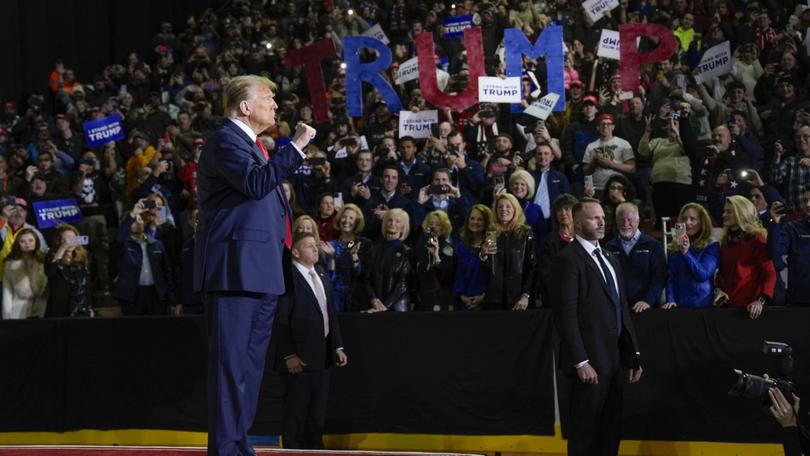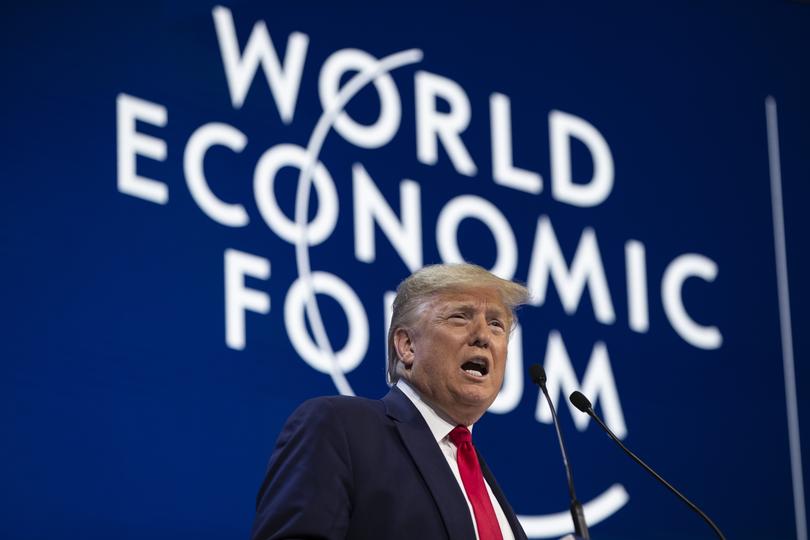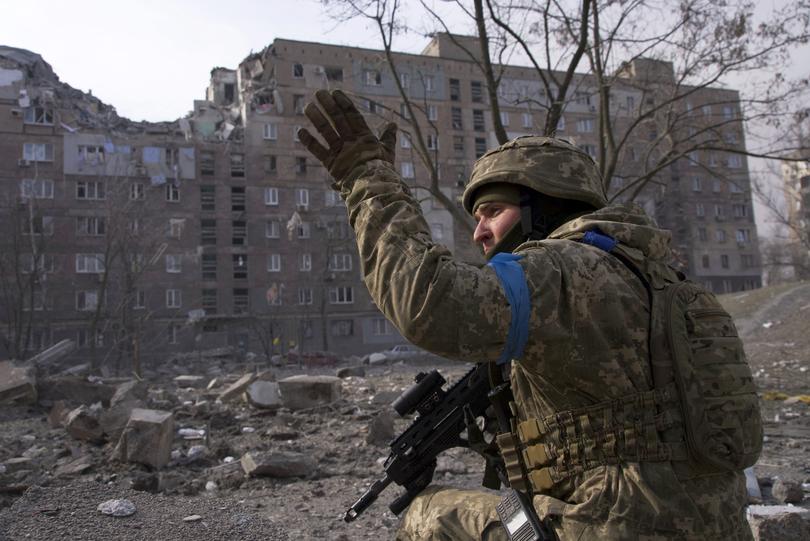The Economist: The world is bracing for Donald Trump’s possible return
The presidential election is ten months away. Just as financial markets place bets on future events, the world is starting to prepare for the consequences of a second Trump presidency.

The new global disorder was on full display at this year’s gathering of the World Economic Forum on January 15th-19th. China’s officials and bosses now attend only in small numbers and are fearful of deviating from Communist Party dogma. Russia’s oligarchs are banished from the magic mountain. And swaggering India and Saudi Arabia see a multipolar world full of opportunity.
Overshadowing it all was the possibility of Donald Trump’s return to office, a prospect brought nearer by his victory in the Iowa caucus on January 15th and the withdrawal of Ron DeSantis from the Republican race on January 21st. (Mr Trump also looks set to sweep New Hampshire in its presidential primary on January 23rd.) One American lawmaker engaged in background diplomacy to calm allies says foreign governments “are freaked out by what they see on social media about American democracy”.
The presidential election is ten months away. Just as financial markets place bets on future events, the world is starting to prepare for the consequences of a second Trump presidency. As best one can tell they include tariffs, the possible abandonment of Ukraine and Taiwan, a transactional approach to other allies, aggressive bartering with enemies and a further decay of global rules.
Sign up to The Nightly's newsletters.
Get the first look at the digital newspaper, curated daily stories and breaking headlines delivered to your inbox.
By continuing you agree to our Terms and Privacy Policy.All American administration changes create discontinuities in foreign policy: Richard Nixon went to China and Ronald Reagan told the Soviet Union to tear down the Berlin Wall. Yet a shift from a Biden administration to a Trump one would be especially large because of the gulf between their policy positions and the chaotic global circumstances in which a switch would take place, with a proliferating number of wars. The number of state-based conflicts, at over 50, is near its highest level since 1946, according to the Peace Research Institute Oslo.

The Biden administration has tried to reinvent America’s role for the 2020s and beyond. It envisioned a superpower that is still globally engaged and close to its allies. At the same time, it is more selfish on trade, more cautious on economic security and more selective about deploying military force, especially troops on the ground. The achievements of this approach include a re-galvanising of alliances in Asia and the coalition to support Ukraine. Even so, global disorder has grown: a decay in the global rules-based order; disarray in the Middle East, parts of Africa and Afghanistan; and an undiminished strain of isolationism in American politics and public opinion.
Biden administration officials insist there is no sign yet that their foreign counterparts are “hedging” their bets on a new presidency. They are touring the world to reassure foreign governments. The administration insists it will get a new funding package for Ukraine through Congress shortly. But as the clock ticks down to a tight election the effectiveness of the Biden doctrine may decline. It will become hard to make commitments extending beyond 2024, including on a two-state solution in the Middle East. So governments around the world are developing alternative plans for a Trump-run America.
A second Trump presidency would be different from the first both because the world is messier and because Mr Trump is less likely to tolerate official obstruction of his agenda. An across-the-board 10% tariff is said to be likely, as is a suspension of “permanent normal trade relations” with China resulting in even higher levies for it than exist today.
Most allies will be seen as users by Mr Trump. They can expect unsentimental treatment.
For some politicians and countries, with whom Mr Trump is ideologically aligned, his presidency would be good news. In Israel Binyamin Netanyahu, if he can cling on to power until 2025, could expect fulsome support and the dismissal of Palestinian aspirations for their own state. Soulmates such as Viktor Orban in Hungary can expect a warm reception in the Oval Office. Mr Trump also has a soft spot for Saudi Arabia under its de facto ruler and crown prince, Muhammad bin Salman. Narendra Modi, India’s prime minister, has strong relations with Mr Trump and so India expects continuity in policy and less criticism on civil liberties. Even some liberal democratic Western allies seem relaxed. “There’s nothing to be troubled about there,” insists Scott Morrison, Australia’s former prime minister, who says that Mr Trump helped the world “wake up” to the threat from China. “When Australia stood up to China, they were immensely supportive. And that mattered a hell of a lot.”
Beyond this Mr Trump’s chaotic style and unstable personality make predictions difficult. Nonetheless it is possible, and probably essential, to try to sketch out what the approach of this most transactional of presidents might be to those he may deem “users” (supposedly ungrateful allies), “bruisers” (nasty adversaries) and “losers” (countries he doesn’t care about).
With friends like these
Most allies will be seen as users by Mr Trump. They can expect unsentimental treatment: an assessment of the extent to which they “freeload” off America, for example by running a trade imbalance with it or spending paltry amounts on their armed forces. The scrutiny could get uncomfortable (see chart). We calculate that of 38 American allies in the North Atlantic Treaty Organisation (nato) or Asia, America had trade deficits with 26 in 2023, and 26 spent less than 2% of gdp on defence in the last year for which figures exist, thus scoring badly on two key Trumpian yardsticks.
Some countries are already trying to boost their appeal on these measures. A German government official describes the provisional pitch it will make to any Trump administration: Germany’s defence spending is set to soar following the creation of a $109bn special military fund, so it is no longer free-loading; it is now spending $14bn on American F-35 jets, and the country has switched from piped Russian gas to importing liquefied natural gas, much of it bought from American suppliers.
Users that are unable to make a case on these grounds may find themselves under pressure. They are more likely to be subject to threats on tariffs or have security commitments withdrawn. Mexico might be one such. Since the Trump administration replaced the North American Free Trade Agreement with its own deal, in force since 2020, the trade deficit has actually gone up.
In response some users are considering unorthodox diplomacy to win favour instead. One Western leader explains that based on the experience of Mr Trump’s first term, the easiest way to sway him is by showering him with attention from a country’s royal family and sports stars. France wowed Mr Trump with a military parade on Bastille Day; Britain offered up a state visit involving the late Queen.
A pair of allies are especially vulnerable to the way Mr Trump thinks about suspected freeloaders. Taiwan, for its size, runs a large trade surplus with America, amounting to $45bn between January and November 2023. Although it has raised defence spending to 2.5% of gdp it still relies on a vast American military presence in Asia to deter a possible invasion by China. It has just elected a president who defies China, William Lai Ching-te, but Mr Trump may question whether Americans should bankroll its defence or die for that cause. Last year he complained that Taiwan “took our business away”.
The other vulnerable ally is Ukraine. Objectively American support to Ukraine is a superb deal: with cumulative American aid for the war standing at below 10% of the annual us defence budget and no American casualties, America ties down Russia’s army and impairs its economy. Most of the money spent on weapons for Ukraine remains in America. Still, Mr Trump may see the war as a drain on American resources and try to push Ukraine to strike a peace deal with Russia.
Abandoning Taiwan and Ukraine would have profound consequences for America’s alliances. A failure to defend Taiwan would set a precedent for other Asian allies such as Japan and South Korea and, because it forms part of an “island chain” around China, frustrate regional defence plans. Betraying Ukraine would leave both Russia and its leader, Vladimir Putin, in strengthened positions and raise questions about America’s commitment to nato, even if Mr Trump did not explicitly renege on American security guarantees. A top official in the European Union recently claimed that in 2020 Mr Trump told Ursula von der Leyen, the head of the eu Commission, that America would not come to Europe’s aid if the continent came under attack, adding: “By the way, nato is dead, and we will leave, we will quit nato.”

Enemies of the state
What about those Mr Trump may perceive as bruisers? America’s enemies and adversaries probably expect threats in order to win concessions and also periodic openness to striking transformative “deals”. Think of Mr Trump in 2019 stepping across the border into North Korea—which he had earlier threatened to incinerate. Among the bruisers, Russia can look forward to the friendliest treatment given Mr Trump’s admiration for Mr Putin. China will have lower expectations as previous negotiations with Mr Trump disappointed and because mutual hostility is now baked into both countries’ polities.
During the first Trump administration Iran faced “maximum pressure” sanctions and the killing of Qassem Suleimani, a key commander, yet Mr Trump failed to respond when Iran attacked Saudi Arabian oil installations. The most likely outcome now, given the mayhem Iran is causing in the Middle East, is aggressive sanctions on the regime, which may be tempted to keep up its proxy wars across the region.
Mr Trump’s approach to bruisers is disruptive, which creates opportunities: it is conceivable, for example, that he might try to draw Iran and its proxies into a regional peace deal—after all his administration brokered the Abraham Accords between Israel and several Arab states in 2020, defying accepted wisdom. An Israel-Saudi Arabia deal might be more likely to succeed, however. Yet the same disruptive quality increases the chance of miscalculations. Mr Trump’s partiality for negotiations with adversaries may create windows for deals. But there is a risk that he is outmanoeuvred. “My biggest fear is that Putin and Xi are way smarter than Trump,” says a European official.
All the others
The third group of countries is the biggest: places that are neither close American allies nor adversaries. Mr Trump could write them off as losers. The Biden administration has encountered more aggressive behaviours from America’s foes in Europe and the Middle East but remained selective in its use of American power. Its withdrawal from Afghanistan illustrated as much. And conflicts in places America has little interest in have flared up wildly including the civil war in Sudan; a new “coup belt” across sub-Saharan Africa; and a new Armenia-Azerbaijan war. The same anarchic quality has created opportunities, too: think of the rewiring of the global energy system and the boom in the illicit oil trade.
A Trump presidency is likely to see a further erosion of global rules on everything from trade to human rights, worsening matters. For the poorest countries with weak domestic institutions, that may mean a higher prospect of conflict. It is unlikely that global organisations can fill the void.
If Mr Trump were to win the 2024 race he would be inaugurated in January 2025, almost exactly a year from now. The period until then is too short for the Biden administration to easily make binding commitments, meaning its credibility and agency over global events may fade this year. The situation is vastly worsened by Republican obstructionism, as demonstrated in the senseless halting of aid to Ukraine. Yet a year is also far too short a time for countries waking to the possibility of Mr Trump’s return to put in place any kind of alternative to America, from trade rules to additional nuclear deterrence. At the very least that will create a vacuum as America withdraws from its responsibilities. Around the world it is dawning that 12 months are not enough to fill it.
